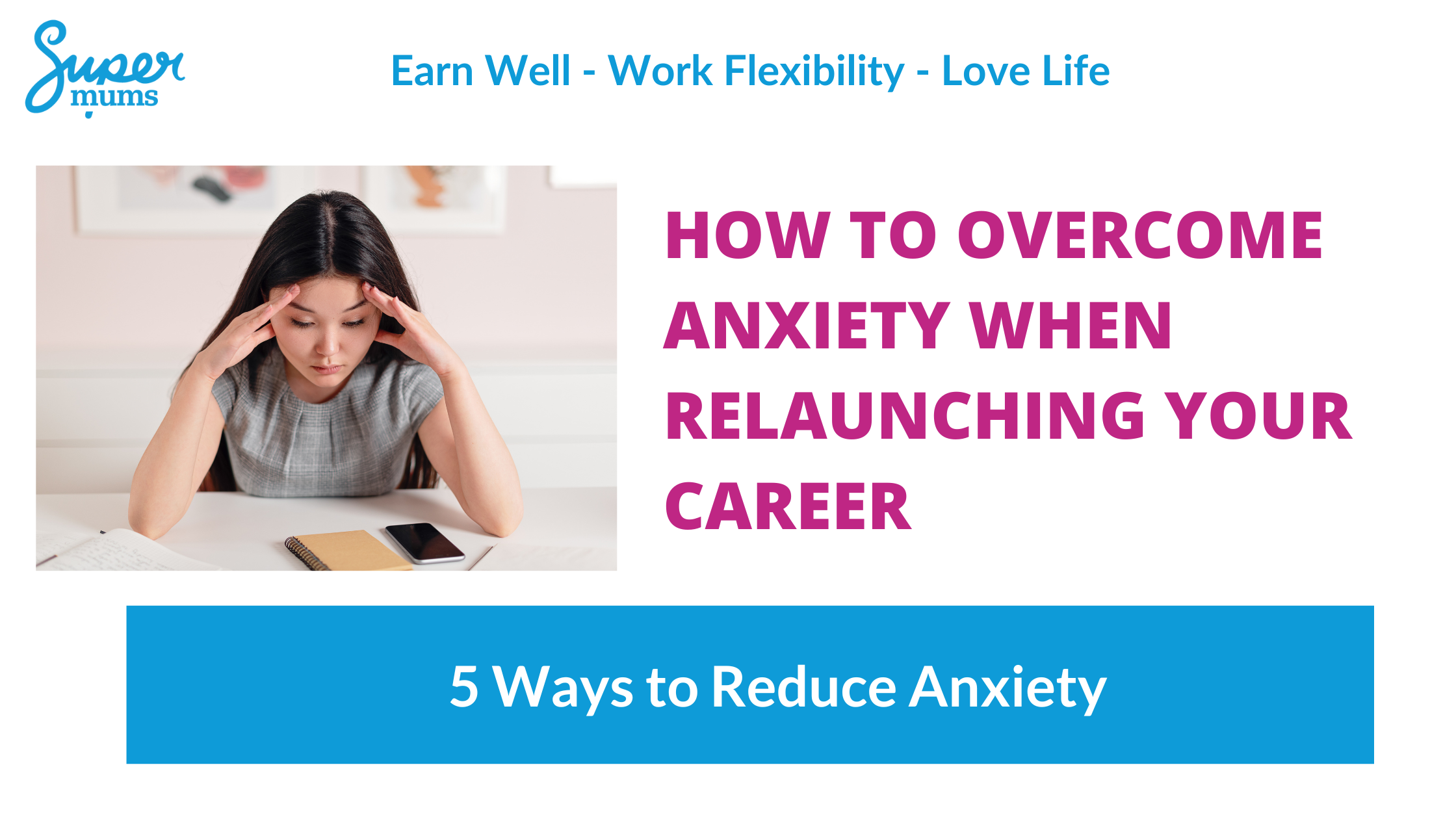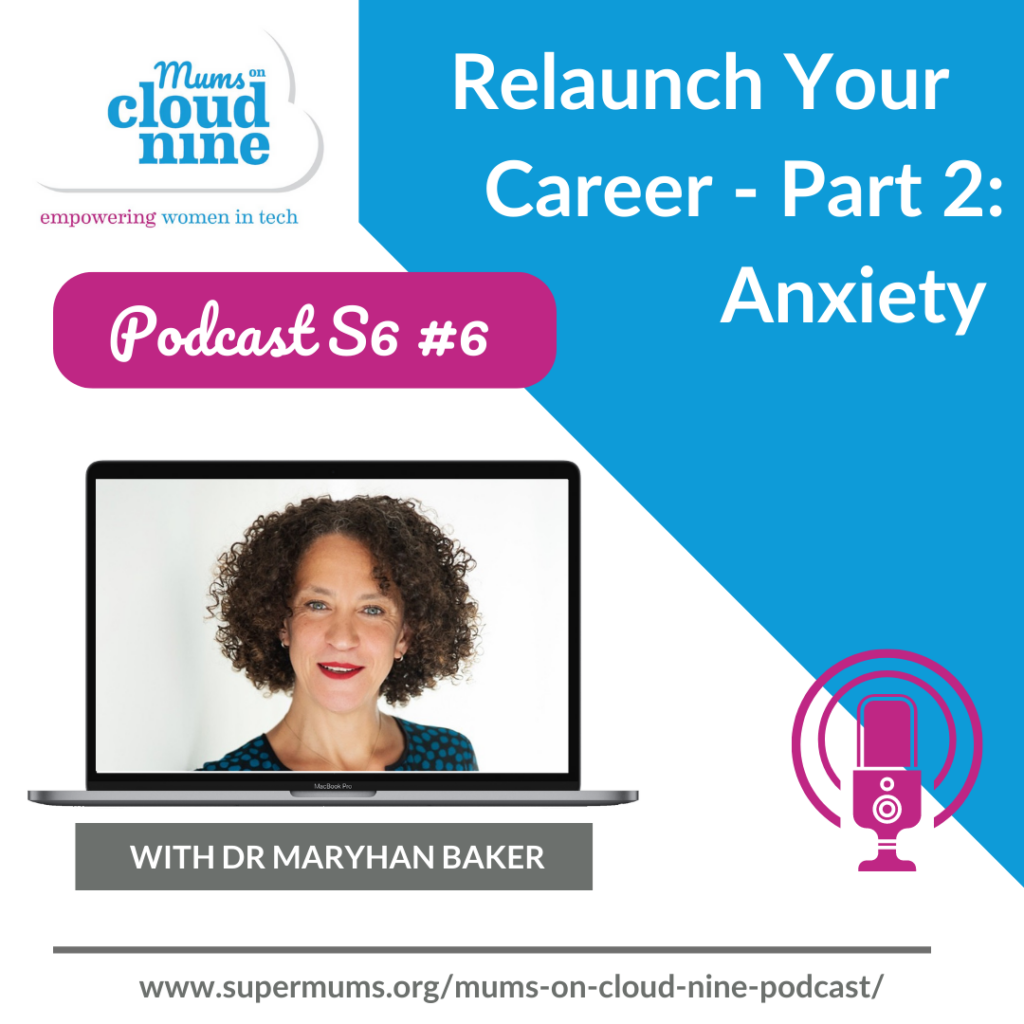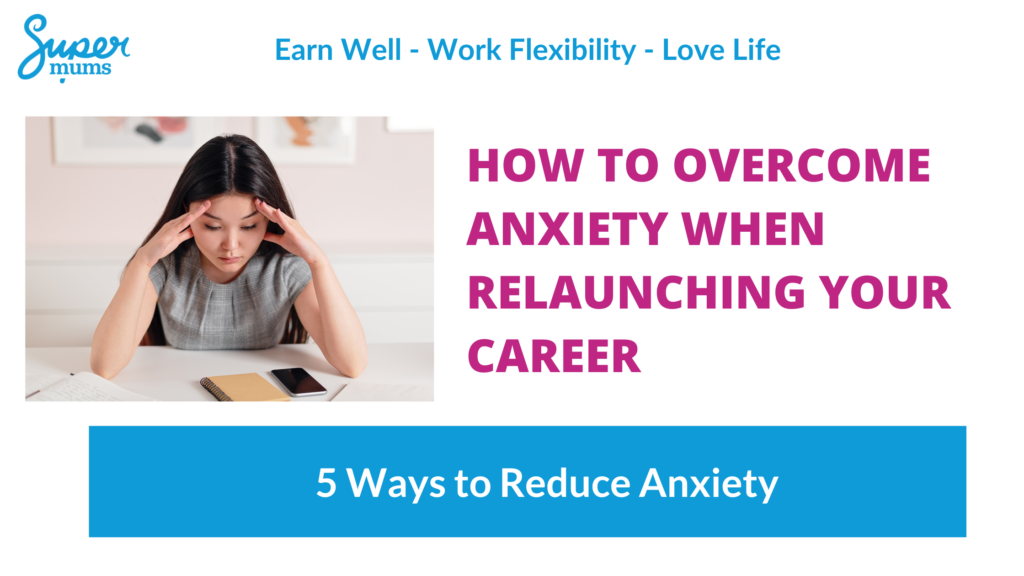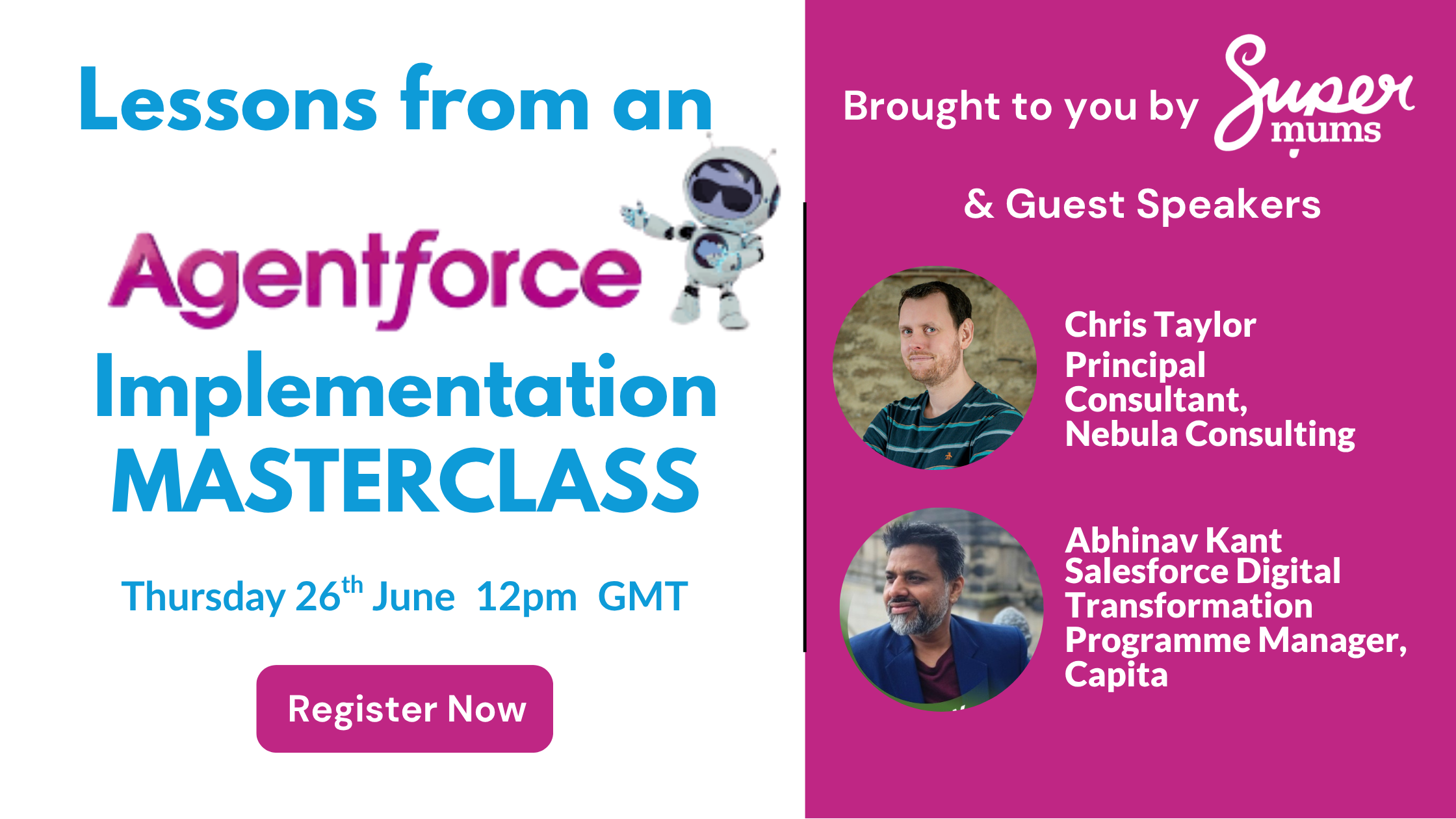Relaunch Your Career Part 2 – How to Overcome Anxiety
By Heather Black

Over the next 6 weeks we are talking about how to instil the right mindset to relaunch your career successfully.
At Supermums we specialise in helping people to relaunch their career and we understand the challenges that many parents face when thinking about taking the plunge to re-skill and relaunch a career into something new. It’s a scary prospect so it’s so important to get the right support around you to make it happen successfully. Supermums combine coaching, mentoring and training to empower trainees with the right mindset to launch their career successfully. We wanted to share some of this wisdom with you so you better understand it yourself or share with it someone who might be in that position. Join us to learn about the following mindset attributes that can support you on your journey to relaunch your career:
- Relaunch Your Career Part 1 – How to relaunch your career with confidence
- Relaunch Your Career Part 2 – How to overcome anxiety
- Relaunch Your Career Part 3 – How to re-energise yourself to perform
- Relaunch Your Career Part 4 – How to stop burnout before it starts
- Relaunch Your Career Part 5 – How to manage Your time better
- Relaunch Your Career Part 6 – How to juggle a career and kids effectively

This week we look at Part 2 – How to overcome anxiety.
To discuss relaunching your career and how to overcome anxiety Heather Black, CEO of Supermums was delighted to be joined by Dr Maryhan Baker on this weeks Mums on Cloud Nine Podcast. Dr Maryhan is a Psychologist, Parenting Expert and Online Educator and Podcast Host of ‘How Not to Screw Up Your Kids’.
Listen to this week’s podcast to understand how to identify anxiety and how to overcome it for yourself, as a parent and, for your children.
If you don’t want listen to the whole podcast, check out the highlights below:
When is Anxiety a problem?
It’s when it gets in the way of you being able to live your life normally. I think all of us worry, we are all anxious to some level.
Stress is a normal part of life and worrying is normal, but when it stops us from being able to do something where we feel paralyzed at being able to do something, that’s when it’s a problem.
How do you detect if you are experiencing anxiety?
We actively try and avoid a situation that makes us feel anxious and if we allow ourselves to continue avoiding it, actually what we do is re-reinforce the anxiety. So it’s really important that we reframe it in our head that actually I need to slightly push myself in that, in the thing that I feel particularly anxious.
What strategies can help us overcome anxiety?
So when we’re anxious and we’re nervous and we’re stressed and we’re overwhelmed, we feel it in our bodies. and it’s different for different people. So that’s one side of the seesaw.
And then the other side of the seesaw is the conversation that we have in our head that says, I can’t possibly do sit an exam for example?. What if this happens? What if I forget something? Or whatever that kind of conversation is.
So the best way rebalancing the seesaw is to address both sides.
So we have to work on what’s physiologically showing up in my body. Can I find ways to help calm? So I take my body from fight or flight. You feel scared and you wanna run away to a little bit of calm. And that might be breathing exercises, it might be meditation, it might be about just taking ourselves out somewhere. Distraction.
It’s also just being aware that we have a conversation in our head all of the time. And because that conversation in our head has our attention, it doesn’t make it true. So if we tell ourselves, I’m rubbish at exams, I’m not good at studying, I’m not good at taking notes. I always forget things. That’s not a truth. That’s just what we’ve told ourselves. That’s our critic, and we need to recognize that and then recognize that there’s an alternative narrative of, I usually get a bit nervous in exams and I feel like, I can’t remember, but I know that if I can find some way, You know, creating a bit of calm that it all then suddenly comes back to me.
So it’s, it’s dealing with that both sides of the seesaw really.
How can we prevent anxiety showing up in the first place?
You could journal every day, whether you journal or whether you just write bullet points. But I think as human beings, we get so caught up in autopilot just doing the same thing. Rinse and repeat, that we just need to sometimes break that habit in a reflective practice that you do.
So if it’s a Tuesday, you are reflecting on Monday, allows you to kind of spot patterns. And being able to work out, oh gosh, you know, I’m in a particular spot at the moment. I’ve noticed that, I’m feeling slightly overwhelmed, or, I’m resentful, or I’m tired, whatever those sorts of things are. And then we can be much more preventative.
So I think reflective practice, definitely. And then the other thing is just being aware of, you know, where your head goes. Sometimes the mindset, the default assumptions that we have, the things that we say automatically that we should sort of sometimes put ourselves up on and say, Excuse me, where’s the evidence for that comment that I’ve just made to myself in my head?
As parents we can struggle with anxiety to relaunch our career, because our children are anxious, so how can we support children with anxiety?
The one strategy that I find really helpful to explain to children is a glitter jar. So literally have an old water bottle or a jam jar that you have water in it and then you put glitter in. It’s a brilliant way of explaining emotions to children. So the idea is that when you’ve got the jar and the glitters at the bottom, So you talk about this idea that the water in that jar is like their mind first thing in the morning. It’s clear, it’s calm, it’s still, they can see through it and they can make good choices. From the moment they wake up, they start thinking and those thoughts are represented by the glitter. You get. We get little speckles. We’re often thinking about, Oh, I’m hungry. Is it a school day? What am I going to wear? What am I gonna have for breakfast? Whatever it is we’re thinking constantly, but while when we’re thinking normally the splits around, but we can still see through the water and it’s clear, it’s calm, it’s still, and we can make good choices. When we experience a big emotion where we’re super nervous or super angry, instead of this lovely calm bit of glitter, we get this swirling, and that’s when we shake the the bottle or the jar.
And in those moments, a child can very vividly, very accurately see that there is no way that they can see through that water. Because there’s glitter everywhere. It’s not calm, it’s not still, and they’re unlikely to make good choices. So that’s a great way of just communicating about. emotions, and then it gives you a shared narrative, a shared language around creating space.
So what would happen if we just left the jar for a moment or two? What would happen? And then obviously the glitter settles to the bottom. And what is really good to then explain to a child is. What we were nervous about and worried about or angry about, has now gone to settle to the bottom. And now we’ve got this clear space that we are more likely to make a good choice.
So just giving them that framework and that shared language then helps you to explain the internal chatter that helps you explain all of the feelings that they might have, that you know the tummy ache that they might experience, the sweaty palms, the heart beating fast, so they can start working on.
When do you seek external support for a child?
There are two things that I would say are the biggest indicator that you’ve got a child who’s struggling, who is probably feeling anxious. Number one is a child who often complains of tummy ache, and number two would be a child who finds it difficult to to fall asleep at night. And the reason for that is that we all have an internal dialogue. During the days, children are supremely busy. They’re busy doing things, as are we. Although sometimes, we make ourselves busy to avoid it, but when children go to bed at night, they’re left with their thoughts. If you’ve got a child who worries, they might be ruminating. So going over what’s happened in the day, what they could have said should have done, or they’re worrying about something that’s either gonna happen the next day or in a few days time, so they find that. Sometimes we might talk about having a busy brain, they just can’t quieten it. But if they have us with them, then they usually fall asleep much more quickly.
So those are the two biggest. There’ll be other things, you know, seeking control, and those sorts of things. But typically those are the two things that I would say you, that you’ve probably got a child who is feeing particularly anxious. At that point then absolutely get some additional support. And a lot of the times, if we catch it early as parents, we can support them if we just know what tools and strategies to use.. Obviously at the extreme case then you’ll needs much more professional advice for, for the, for your child and for you as a parent. But a lot of the time, if we are clued in and we can spot it early, we can do a lot of the intervention with some guidance.
If you are planning to relaunch your career and you want to some reassurance to help you make an informed choice, then book in a free career consultation with our team about whether a Salesforce Career is an option for you. Find out more today!
Thinking about re-launching your career?

Find out more about what a Salesforce Career is
Whether you are returning to work after a break, on maternity / paternity / career leave, or currently working and looking for something with more flexibility or better pay, we’ve got you covered! Supermums are passionate about education, and we accelerate your success by providing not only the technical training, but also mentoring, coaching, work experience, peer support and job search support.

Supermums is proud to be an approved training provider of Salesforce

Written By:
Subscribe To Our Weekly Top Tip Bulletin
Get Updates And Learn From The Best











